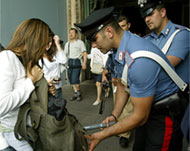Two jailed in Italy on terror charges
An Italian judge has convicted two North Africans of belonging to a hardline cell alleged to have planned attacks in Italy, including one against Milan’s subway.

Judge Silvia Milesi on Wednesday sentenced the defendants – Moroccan Mohamed Rafik and Tunisian Kamel Hamraoui – to up to four years and eight months in prison, a defence lawyer said.
A third suspect, Tunisian Najib Rouass, was sentenced to one year and two months in prison on the lesser charge of inciting violence, while a fourth, Tunisian Romdhane Ben Othmane Khir, was acquitted, said lawyer Ilaria Crema.
All defendants denied the charges, and those convicted are expected to appeal the ruling. Prosecutor Roberto Di Martino described the verdict as a “balanced ruling”.
The trial in Brescia, about 96 km east of Milan, drew to a close amid renewed fears of an attack in Italy and increased security across the country following the London bombings last week.
Large raid
Earlier on Wednesday, Italian police carried out raids against suspected Islamic hardliners, conducting about 200 searches across the nation, the Interior Ministry said. No arrests were reported, but the Interior Ministry said that 174 people were being questioned.
It said the questioning focussed on their legal status in Italy, and might lead to expulsions from the country in some cases.
 |
|
Raids were carried out in cities |
The raids were carried out in cities across Italy, including Milan, Rome, Naples, Turin and Bologna. Interior Minister Giuseppe Pisanu, speaking in Brussels on the sidelines of an EU emergency meeting to assess the bloc’s security measures, said the raids were part of a preventive strategy, according to the Apcom news agency.
The four suspects in Brescia had been granted at their request a fast-track trial that allows for lesser sentences if suspects are convicted. Six other North Africans, believed to have belonged to the same cell, are being tried in nearby Cremona, about 100 km southeast of Milan.
North African connection
Among them is Moroccan Ahmed El Bouhali, who disappeared in 2001 and was considered by investigators the cell’s leader. He is being tried in absentia.
Investigators have said the cell was connected to international terrorist networks for which it raised money, faked identity documents and recruited extremists to fight abroad.
Members of the cell also discussed attacking Milan’s subway and the cathedral in Cremona in October 2002, authorities alleged.
Di Martino, the prosecutor, said the cell was believed to also have contacts with Osama bin Laden’s al-Qaida network, without elaborating.
Milan centred probe
Most of Italy’s anti-terror probes have been based in northern Italy, especially in and around the Milan area. Authorities say that Italy mainly served as a base of logistical support.
Both Rafik and Hamraoui were arrested in 2003 as part of their investigation into the alleged hardline cell, based in Cremona.
 |
|
Pisanu (L) has called for changes |
Rafik, who has lived in Italy since 1998, served as imam in Florence before moving to Cremona. Considered a key suspect in the case, he was given a sentence of four years and eight months in prison, while Hamraoui was sentenced to three years and four months.
Rafik is alleged to have ties to the Muslim hardline movement Salafia Jihadia, which Moroccan officials have blamed for the 2003 bombings in Casablanca. He denied any involvement.
Extradition rejected
Italy’s highest court has rejected an extradition request issued by Moroccan authorities. Prosecutors had requested a nine-year sentence for Rafik and a sentence of four years and six months for Hamraoui.
Milesi’s reasoning on her verdict must be released within 90 days. Officials said the verdict was one of the first convictions under Italy’s international terrorism charge, which allows for stiffer sentences and was enacted after the 11 September 2001 attacks in the United States.
The ANSA news agency said the only previous conviction on the charge was the result of a plea bargain. Prosecutors have sought sentences under the charge for many other suspects who have either been acquitted or sentenced on lesser charges.
Italian Interior Minister Giuseppe Pisanu called Tuesday for modifications to the international terrorism charge so it could be used more easily against loosely knit international groups, such as those linked to al-Qaida.
Pisanu was briefing the Italian parliament on proposals for tightening security following last week’s deadly bombings in London.